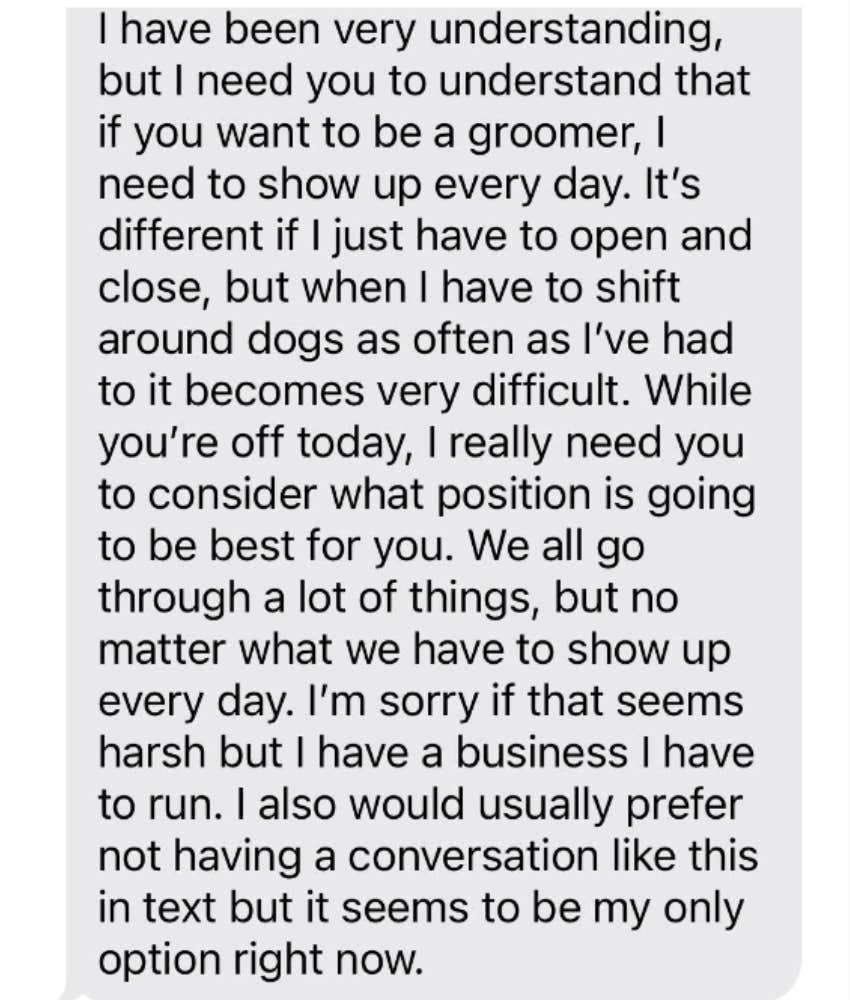Woman Shares The Text She Got From Her Boss After Missing 2 Weeks Of Work Because Her Dad Died
Many emphasized the need for employers to show compassion and flexibility towards grieving employees.
 Tero Vesalainen / Shutterstock
Tero Vesalainen / Shutterstock Following the loss of her father, a woman understandably required some time off from work to grieve.
However, when she extended her absence by one additional day after a two-week break, her boss confronted her about the necessity of returning to work despite the circumstances.
Seeking opinions on the appropriateness of her boss' reaction, the woman turned to others for advice.
The woman’s boss reminded her that all of us encounter tough times after the woman requested more time off after her father passed away.
The woman shared a screenshot of the message she received from her boss on the subreddit r/antiwork just a couple of weeks after her father passed away.
 Photo: Reddit
Photo: Reddit
The woman, who works as a dog groomer, revealed that her father had spent two weeks in the ICU before passing away, and she had missed a considerable amount of work between being with him in the hospital and the funeral.
On the day she was scheduled to return to work, she asked her boss if she could take one more day off.
While her boss accepted her request, she informed her that there was a bigger conversation that needed to be had. “I have been very understanding, but I need you to understand that if you want to be a groomer, I need you to show up every day,” her boss wrote to her in a text message.
Her boss claimed that it is difficult for her to have to constantly shuffle around grooming appointments and accommodate for her absences. “While you’re off today, I really need you to consider what position is going to be best for you. We all go through a lot of things, but no matter what we have to show up every day.”
 Photo: mimagephotography / Canva Pro
Photo: mimagephotography / Canva Pro
“I’m sorry if that seems harsh but I have a business I have to run.”
The woman’s boss added that she would prefer to have a conversation with her in person rather than over text, but she did not see how it was possible given that the woman was never at work anymore.
Most people believed that the boss’ response was inappropriate and that she could have demonstrated more sensitivity.
“Really? ‘We all go through things.’ The nerve. Disgusting. Sorry for your loss,” one Redditor commented.
“I’m so sorry for your loss. What a heartless manager,” another user wrote.
“I'm so sorry. I lost my Dad in 2018. It takes a long time to get over, and you need to do whatever is best for you. Period. There will be other jobs,” another user noted. “Some people just don't get it. It's not something that you can explain; it has to be experienced to know.”
Others urged the woman to seek another job with an employer who demonstrates more compassion and empathy.
While every company policy regarding bereavement leave differs, employees are typically granted up to five days of paid time off when a member of their family passes away.
However, some can take up to two weeks to help with funeral services and process their loss without having to worry about work.
Bosses can make it easier on their employees by treating them with grace and allowing them a fair amount of time to grieve.
While everyone grieves and processes their emotions in different ways, we all have to return to work at some point.
Employers count on us, our jobs give us financial stability, and working could even improve mental health in some individuals who are grieving.
Some individuals find solace in the support of co-workers and the structure that work provides, which can aid in the healing process.
While the world keeps turning even after the loss of a loved one, this doesn’t mean that we cannot extend our support, compassion, and empathy to employees when they return to work.
 Photo: fizkes / Shutterstock
Photo: fizkes / Shutterstock
They can provide flexible work arrangements, such as offering extended bereavement leave or allowing for remote work if feasible, to accommodate the employee's needs during this difficult time.
Most importantly, they can demonstrate their empathy and understanding towards the grieving employee's situation.
If work productivity and attendance are a concern, it is worth having a meaningful discussion where a solution can be determined.
Megan Quinn is a writer at YourTango who covers entertainment and news, self, love, and relationships.

